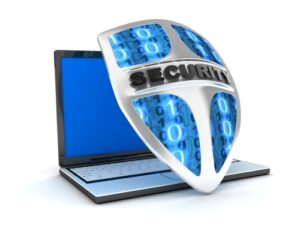Industry News and Information
How to keep your computer and online accounts safe from internet crooks
The internet bears a love/hate relationship from many people. Whether you are a consumer using the internet to find a new dentist or check your e-mails or you are a business that operates predominantly online, there are thousands of reasons for you to be online. Whether you spend five minutes or five hours at a time online, you must make sure that you are secure. Just one little slip up can cause you to be at the mercy of those pesky internet crooks. You do not have to be a computer guru, nor do you need any type of degree; there are many easy ways to keep your computer and your personal information perfectly safe.
Stay Updated
New threats occur on a daily basis, which means that the programs you initially installed are probably vulnerable to attacks. You don’t have to worry though, as long as you properly update the systems. Whether you set your computer for automatic updates or you are prompted to manually update them when new security measures are available, make sure they are being done. Don’t put off updating as the latest security measures are likely put in place to take care of the latest threat. Make it a habit several times a week to check for updates and/or patches to ensure that you are using the most secure programs available.
Alter your Passwords
Having multiple passwords for your PC and your online accounts can seem annoying, but you wouldn’t think they were too bad if you knew the level of security they were offering you. If you have the same password set for every account and log in on your computer, it would not be too difficult for hackers to gain access to your personal information. When you set up your passwords, make sure that each one is secure by using as many letters and numbers as you can, altering lowercase and capital letters and using symbols whenever they are allowed (the stipulations vary per website). Even if you have multiple passwords, it is never a bad idea to change them every few months; this just adds another level of security to your accounts.
Download Virus Protection
Don’t make the mistake of using the anti-virus program that came pre-loaded on your computer. Instead, use antivirus programs that could protect your PC from getting downloaded any malicious or unwanted program. Do your research and find the one that meets your needs in order to ensure your security. The anti-virus programs that are available with your computer purchase are there just for the manufacturer to make more money; it does not have your best interests in mind and it might not even be the most recent copy available, depending on how long the computer was sitting at the store waiting to be sold.
Don’t use a Webcam
Webcams are more of a danger than anything else. Sure, they are convenient if you do any type of video chatting, but they also provide hackers with an easy way into your computer. Not only can they watch you through the webcam, they can also put a virus on your computer that allows them to capture your information. This is a very large danger if you did not get virus protection on your computer, leaving it even more vulnerable to attack, allowing hackers remote access to your computer without you even realizing it.
Always Use HTTPS
If you are going to be sharing personal information or shopping online, make sure that the web address begins with HTTPS and not just HTTP. An HTTPS extension on a web addresses means that your information is encrypted, which deters those internet crooks from grabbing your information. If you go to a site that does not run on HTTPS, be very hesitant about sharing any personal information. If you absolutely have to use the site, install an extension that makes every website HTTPS for you to ensure your safety.
Only Download What you Know
Bright, shiny and very promising ads are going to be all over your computer when you browse the internet, but do not trust them. You do not have a way of telling what is safe and what is not – even the ads from legitimate companies might not be real as hackers have gotten real good at mimicking the sites of the real companies. Before you install anything that promises to answer a problem you are having right now, go to the company itself and on your own. Do not rely on the ad or even a search engine. When you go directly to the website of the company, you have a better chance of knowing if it is legitimate or not. Of course, as stated before, make sure that the website is an HTTPS extension or do not download anything.
Protecting your computer from internet crooks is not as easy as it is used to be. Not only do you need anti-virus protection, but you need to protect yourself from other bad habits that could provide easy access to your computer. The more layers of protection and better habits that you have, the less likely you are to become a victim of internet fraud.
Have you ever been a victim of internet fraud? Let us know in the comments below!
Author Bio- Sandra is a computer networking and security specialist. She is a CISCO certified professional having a flair and expertise in writing about varied topics related to the same. Sandra has written several actionable contents that are extremely handy in addressing cyber security-related concerns. Follow her on Google+ and Twitter.
